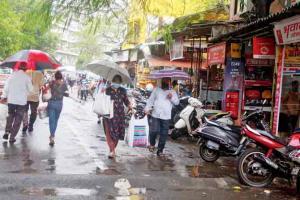On paper, 37 lakh people still live in 544 Containment Zones. On ground, it is already back to business as usual

Residents in Worli Koliwada were out shopping on Friday. Pic/ Ashish Raje
The COVID-19 pandemic is nowhere close to ending and according to BMC's data, the city's slums still have hundreds of Containment Zones, which have a set of strict guidelines, including restriction on people's movement. However, in reality, residents in most of these CZs have gone back to business as usual. Shops have reopened, stalls are back on streets and people are out shopping again.
ADVERTISEMENT
Around mid-May, there were 2,000 Containment Zones (CZs) in the slum pockets of the city, but the civic body combined multiple CZs for better management and the number reduced to 692. By the end of May, with a few more additions, there were 726 CZs in the slums. And three months on, merely 182 have been unsealed.

People out on the streets in Worli Koliwada, the first area to be sealed in the city, on Friday. Daily activities here started long ago. Pic/ Ashish Raje
As of now, nearly 37.8 lakh people are currently living in 544 CZs in the slums across the city, each managed by the respective ward offices. Many of these, like one in Malad, saw stricter restrictions and more police force after the city started reopening in early June. All activities were suspended in areas like Kokani Pada, Tanaji Nagar, Shivaji Nagar, Kranti Nagar, Appa Pada, Pimpri Pada, on the east side of the Western Express Highway. This area is densely populated with a population of over 2 lakh.
All shops have reopened
"In the second week of July, everything was closed, including the grocery shops, and there were police officers everywhere. But now, all shops have reopened and there is no restriction on any activity. How can people stay inside small houses without any employment?" asked Vidya Kambli, resident of Kurar village in Malad East.
Sanjog Kabre, assistant municipal commissioner of P North, told mid-day, "We have withdrawn some restrictions as the number of COVID-19 cases has reduced. The corporation has allowed shops on bigger roads to reopen, but those inside small lanes have to remain closed. The restrictions are imposed for the wellbeing of the people."

The situation is the same in Worli Koliwada, the first area to be sealed in the city. While BMC record says it is still a CZ, all daily activities started long ago and people frequently venture out. Sharad Ughade, the assistant municipal commissioner of G South ward, was unavailable for comment.
More vendors on street now
Life in the densely populated areas, like Govandi, Shivaji Nagar, Mankhurd, also seem to have returned to normal. "There are boards reading 'Containment Zone' in front of many lanes in Shivaji Nagar, but everyone is defying the rules. There are fewer cases now, but the fact is no one is going for testing as they fear losing their wages," said Mumtaj Sheikh activist and resident of Mankhurd. Vendors are back on the roads and the number of vegetable sellers has also increased, she added.
No one's serious
Andheri and Vile Parle West, where the BMC had sealed seven slums in May and flattened the curve in June, still have 20 CZs, but there are no restrictions. "No one is following the rules set for CZs seriously. The corporation unsealed some of the CZs when the number of patients reduced and put up a board stating that they will be sealed again if the cases are found in future. But neither the residents nor the BMC seem serious," said Prasad Aayre, resident of Andheri. Vishwas Mote, assistant commissioner of K west, said, "We unseal the CZs if there isn't any case for 14 consecutive days. That's the norm. There are only a few CZs in the ward now."

People stand outside a shop without maintaining a safe physical distance, at Nehru Nagar, Vile Parle, on Friday. Pic/ Pradeep Dhivar
A BMC official, on condition of anonymity, told mid-day that they are aware about the relaxations in the CZs, but they have allowed people to go out if there isn't a spike in cases within the area, because no one wants to stay indoors anymore. "People want to go back to work, earn some money. We ensure there isn't a violation of physical distancing," he added.
'Project MAITRI' to track patients' health
The BMC along with NGO Project Mumbai has started 'Project MAITRI' to track the health of COVID-19 patients quarantining at home. Healthcare workers will call 'home-isolated patients' for follow-up and take the health status of the patients and their family members. The patients and family members can contact mental health counsellors on: 1800-102-40403 and speak to them whenever needed. They will focus on high-risk patients with co-morbidities or those aged above 55 years. BMC chief Iqbal Singh Chahal said, "The learning and insights from this initiative over the next three months will be shared with other cities and district administrations."
Keep scrolling to read more news
Catch up on all the latest Mumbai news, crime news, current affairs, and a complete guide from food to things to do and events across Mumbai. Also download the new mid-day Android and iOS apps to get latest updates.
Mid-Day is now on Telegram. Click here to join our channel (@middayinfomedialtd) and stay updated with the latest news
 Subscribe today by clicking the link and stay updated with the latest news!" Click here!
Subscribe today by clicking the link and stay updated with the latest news!" Click here!






